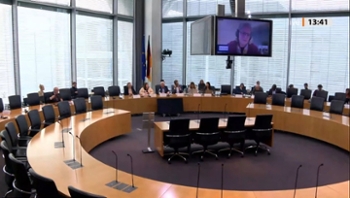Racism and colonial structures in global health
Talk by RKI at the 30th meeting of the Global Health Subcommittee on February 10, 2025 in Berlin
Date: 17/03/2025
On February 10, 2025, the Global Health Subcommittee of the German Bundestag's Committee on Health met for its 30th and final public meeting of the current legislative period in Berlin. During the two-hour session, two central topics of global health were discussed: child health and racism and colonial structures in global health. Watch the recording of the session on the website of the German Bundestag.
Dr. Iris Hunger discusses racism and colonial structures in global health

The second topic block “Racism and Colonial Structures in Global Health” shed light on structural inequalities in global health. Dr. Iris Hunger from the Center for International Health (ZIG) at the Robert Koch Institute was invited as an expert and discussed the topic together with Prof. Dr. Beate Kampmann (Institute for International Health, Charité Berlin) and Anuj Kapilashrami (Centre for Global Health & Intersectional Equity Research, University of Essex, UK).
Dr. Hunger emphasized the need for decolonization of global health structures and the importance of equitable partnerships in international health research and policy. She pointed to specific examples of existing challenges, such as the unequal representation of experts from low-income countries in decision-making bodies or in scientific publications on global health. She also described the approaches to raising awareness and reducing existing inequalities in the international work of the Robert Koch Institute, including in the projects in the Global Health Protection Programme of the BMG (https://ghpp.de/).
The role of the Subcommittee on Global Health

The Subcommittee on Global Health was established to address the cross-border challenges of infectious diseases such as Ebola and tuberculosis, but also antibiotic resistance and the health effects of global migration. It serves as a platform for interdisciplinary cooperation and facilitates the exchange between parliamentary bodies involved in global health policy.
The invitation of the Robert Koch Institute to the 30th meeting of the subcommittee underscores its expertise in the field of global health protection and its ongoing commitment to evidence-based policy-making. Ms. Hunger's contribution makes it clear that reflecting on persisting colonial structures and promoting equal partnerships must remain important topics for the future of global health protection.
